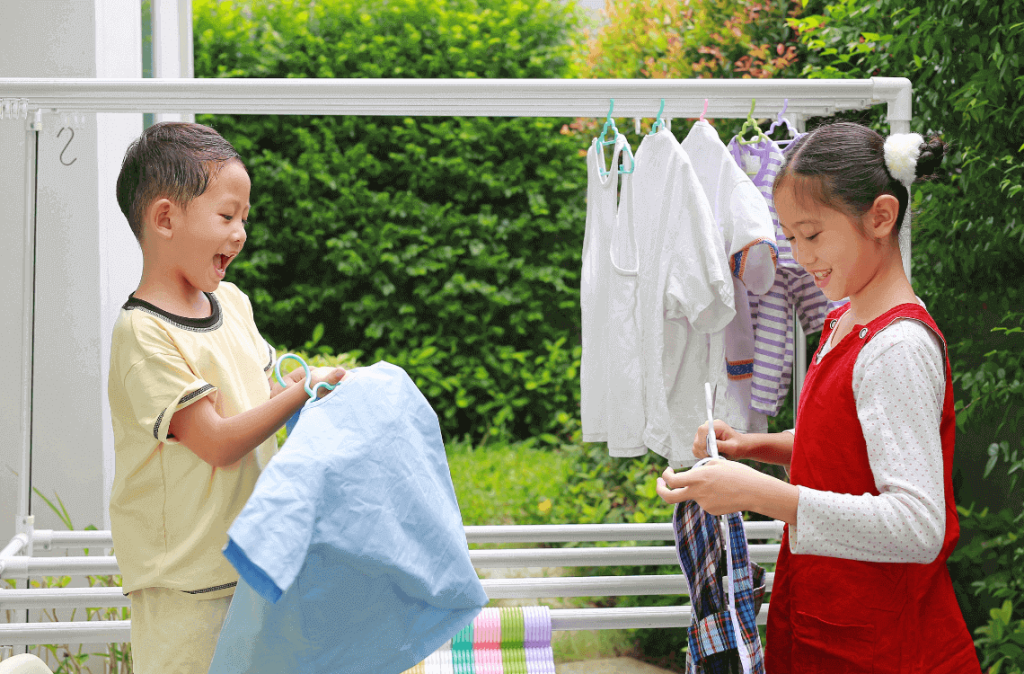Chores and allowance are both important for kids.
It can be said as part and parcel of parenting, in a way.
Because our children will learn the value of responsibility from both.
But the two should not be tied together.
Read on to discover the reasons why doing so may not be wise.
Happy Helpers: Chores for Life Skills & Fun
First, let’s talk a bit about chores.
These tasks can be tedious and time-consuming, but they are necessary for a household to run efficiently.
It may be challenging to persist in having your kids do chores, but they will benefit from the experience.
Here’s why your children should help out with age-appropriate chores around the house:
- Chores teach life skills. Schools don’t teach your kids everything; some lessons, like life skills, begin at home.
- Learns responsibility and self-reliance. Holding them accountable for their regular chores can help them become more self-reliant while teaching responsibility.
- Reinforces respect. They may be more respectful of the work that goes into maintaining a home after experiencing it for themselves.
- Family bonding time. Chores can actually create special moments between children and adults. Little helpers will feel significant and receive a self-esteem boost, while older ones may open up more over a common activity.
- Instils the importance of teamwork. Your kids can develop strong teamwork skills as they learn that family members are accountable to each other and that there are consequences when each other’s expectations aren’t met.
- Improves planning and time management skills. Juggling between schoolwork and housework helps them learn to set priorities and manage their time.
Pocket Money Magic: Teach Financial Smarts with Allowance (Not Bribes)
Now, let’s discuss allowance.
It’s important to note that chores and allowances should be separate.
An allowance is a weekly stipend to teach kids about financial literacy.
It should not be used as an incentive to do what they must learn in life.
Giving kids an allowance is a tried-and-true technique for introducing children to financial responsibility and independence.
Your children will gain basic cash management skills, like saving and budgeting.
It is a key tool if we want to help children develop skills in ethical, creative, and entrepreneurial approaches to money.
When establishing an allowance, always remember the three S’s: spending, saving, and sharing.
Teach your children to practice the notion of spending only a portion of their money. Save some for a future purpose and share a sliver by donating.
This is a brilliant method for them to learn the three most essential things they can do with their cash.
And it’s an important life lesson.
Ditch the Ringgit, Embrace Teamwork: Chores Are Family Time, Not Jobs!
In some households, the line between allowance and chores may become blurred.
This is when parents or caregivers only give out allowances if their children complete chores (or for some, satisfactorily).
It stems from the idea that by paying their kids to help out, it encourages them to appreciate the value of hard-earned money more.
In some ways, this notion is not completely unfounded.
However, it also leaves room for the possibility of them not complying—when it shouldn’t be an option.
Rewards often only buy temporary compliance because they are dependent on a child’s willingness to work for the prize.
Chores can teach children imperative life skills.
Hence, it ought to be cultured regardless of any monetary reward or lack thereof.
Kids should not be raised believing good behaviour—or the willingness to pull their own weight—has to be bought.
Household chores should be every family member’s responsibility.
So if you’re part of the unit, it comes together. Everyone plays a role in helping out.
Teaching kids such responsibility at home with daily age-appropriate chores is nurturing the right attitude for the future.
Family to Future: The Joy of Contribution
There are other ways for our kids to earn or receive financial compensation.
So, let’s avoid making their allowance tied to the household upkeep.
The benefit of seeing chores as learning tools is that your children will also learn to do their chores satisfactorily.
This stems from the sense of accomplishment and pride they can get from their completion.
So, forget any monetary amount.
Positive self-esteem and the belief that money isn’t everything will be much more important to your children’s happiness.
Building Responsible Kids: Start with Chores, Not Ringgit Rewards
Rewards may not work long-term.
For one, it can hinder the improvement of your children’s learning.
It may also breed entitlement and thus be difficult to set boundaries.
On top of that, rewards decrease intrinsic motivation.
Of course, it’s important for our kids to understand the value of money.
But we don’t want them to think that everything they do should have a monetary value.
So, eliminate money from the equation when assigning your child chores.
This allows them to see that everyone contributes equally to the household.
It’s not a job, nor about figuring out which tasks are or aren’t worth it.
It is merely something that has to be done as a member of the family—helping their family home run smoothly and well.
Disclaimer: The information provided in this article is for informational purposes only and should not be considered as medical advice from Motherhood. For any health-related concerns, it is advisable to consult with a qualified healthcare professional or medical practitioner.
For more insightful stories and fun recipes, stay tuned to Motherhood Story!
